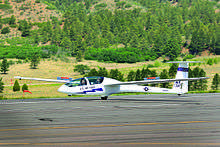DG Flugzeugbau DG-1000
The DG Flugzeugbau DG-1000 is a glider of the Two Seater Class built by DG Flugzeugbau. It has a retractable engine and propeller. It first flew in July 2000 at Speyer in Germany. There are four models, with 18- and 20-metre wings of HQK-51 profile. The latest DG-1001 variant replaced the DG-505 in production.[1]
| DG-1000 | |
|---|---|
 | |
| DG-1000 with 20 metre wingspan. | |
| Role | Two-Seater Class sailplane |
| National origin | Germany |
| Manufacturer | DG Flugzeugbau |
| First flight | July 2000 |
With 18 m (59 ft) span wings it is fully certified for aerobatics (+7 -5 g); with a 20 m (66 ft) span wings it is certified for limited aerobatics (+5 -2.65 g).
The engine (DG1000T) is mounted on a pylon aft of the double cockpit. There is a reduction gear (2.3:1.0) between the engine and the two-blade carbon-fibre composite propeller. The propeller was designed by and made in the DG factory.
Operational history
In 2011, the DG-1000 was selected by the USAF as a replacement for the Blanik TG-10. It will serve as a basic soaring trainer for cadets at the United States Air Force Academy. It also serves as the primary competition platform for the USAF Academy Aerobatic Demonstration Team. Its USAF designation is TG-16A.[2][3]
Variants
- DG1000T
- Retractable pylon-mounted engine, aft of the cockpit, with a 2.3:1 reduction gear driving a two-blade carbon-fibre composite propeller, designed and produced by DG.
- DG-1001
- Refined version with electric landing gear retraction.[4]
- DG-1001e neo
- fitted with front electric sustainer - due to fly 2020.[5]
- TG-16A
- USAF designation. Used to train cadets in soaring at the United States Air Force Academy, replacing the LET TG-10 Blanik.[3]
- Akaflieg Karlsruhe AK-9 or
- A 0.400 kN (90 lbf) turbojet engine was installed in a two seater DG-1000. In Cooperation with the Institute for Thermal Flowengines at the KIT the behavior of the AMT Titan turbojet, from Dutch producer Draline, was researched, improved and fitted with an exhaust attenuator.
- DG-1000J:also known as 'Akaflieg Karlsruhe AK-9', registerd D-KAKJ, named "Jet".
Operators
Military

Specifications (DG1000T)
Data from
General characteristics
- Crew: 2
- Capacity: 160 kg (353 lb) of water ballast
- Length: 8.57 m (28 ft 1 in)
- Wingspan: 20 m (65 ft 7 in)
- Height: 1.83 m (6 ft 0 in)
- Wing area: 17.5 m2 (188 sq ft)
- Aspect ratio: 22.8
- Empty weight: 461 kg (1,016 lb)
- Gross weight: 750 kg (1,653 lb)
- Propellers: 2-bladed DG fixed-pitch propeller
Performance
- Never exceed speed: 270 km/h (170 mph, 150 kn)
- Maximum glide ratio: 46.5
- Rate of climb: 1.3 m/s (260 ft/min) (engine on, still air)
- Rate of sink: 0.5 m/s (98 ft/min) (engine off and retracted)
References
- Bayerl, Robby; Martin Berkemeier; et al: World Directory of Leisure Aviation 2011-12, page 142. WDLA UK, Lancaster UK, 2011. ISSN 1368-485X
- "AF Academy buys 19 new gliders for cadet training | koaa.com | Colorado Springs | Pueblo |". koaa.com. Archived from the original on 2012-03-24. Retrieved 2012-12-06.
- Baillie, Amber (2012-07-26). "End of an era: 94th FTS phases out TG-10 gliders". Usafa.af.mil. Archived from the original on 2013-01-04. Retrieved 2012-12-06.
- Tacke, Willi; Marino Boric; et al: World Directory of Light Aviation 2015-16, page 174. Flying Pages Europe SARL, 2015. ISSN 1368-485X
- DG Flugzeugbau. "DG-1001e neo Project Update". Retrieved 8 July 2020.
- "DG Flugzeugbau: AAFC". Dg-flugzeugbau.de. Retrieved 2014-01-16.
- "DG Flugzeugbau: DG-1001 Club Indonesien". Dg-flugzeugbau.de. Retrieved 2013-06-05.
- "Factsheets : 94 Flying Training Squadron (AETC)". af.mil. Archived from the original on 3 March 2016. Retrieved 15 March 2016.
External links
![]()